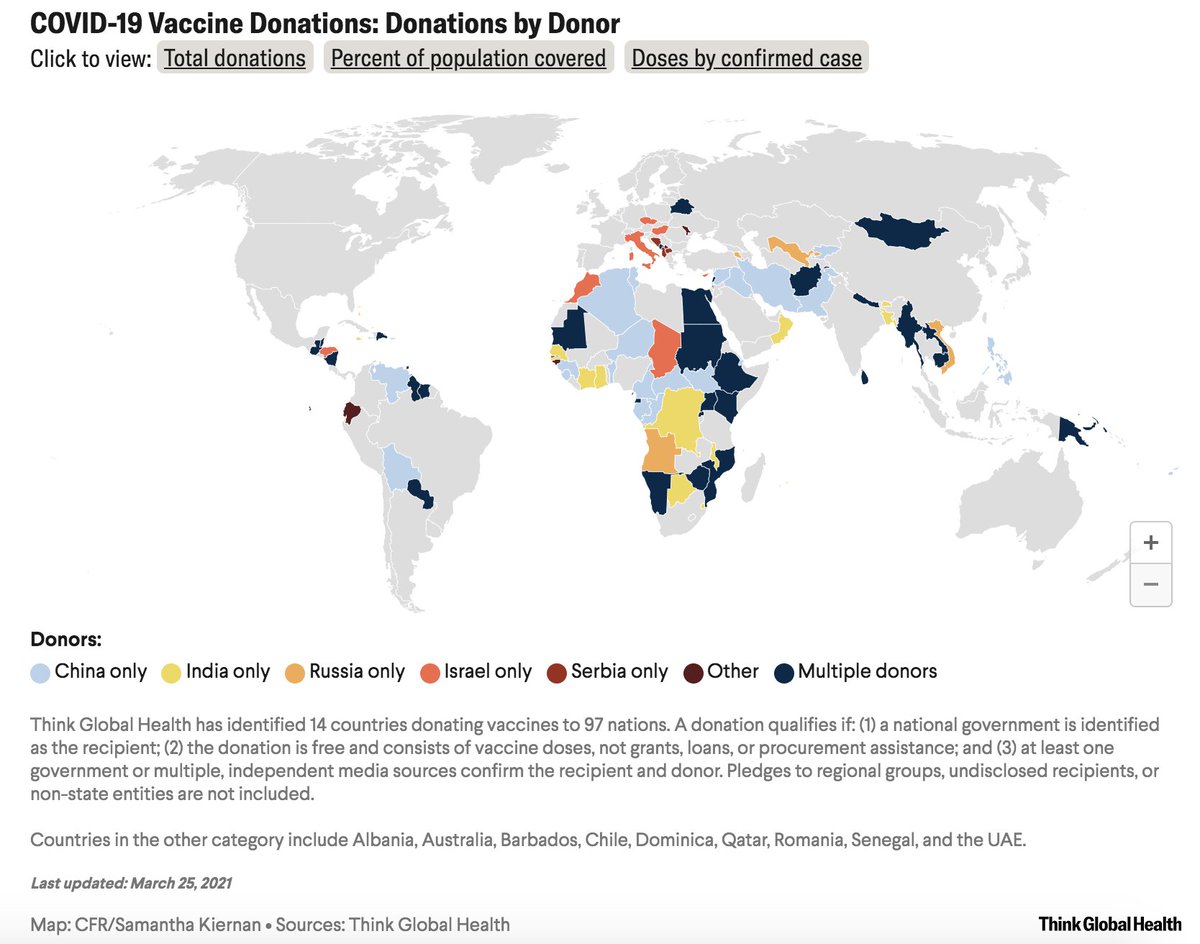
6 months into #COVID19, our best measures of pandemic preparedness have not been correlated w/fewer deaths
In fact, nations w/higher JEE, GHSI, and #UHC scores have had *higher* death rates, even accounting for age structure & timing of 1st case
why? 1/
In fact, nations w/higher JEE, GHSI, and #UHC scores have had *higher* death rates, even accounting for age structure & timing of 1st case
why? 1/
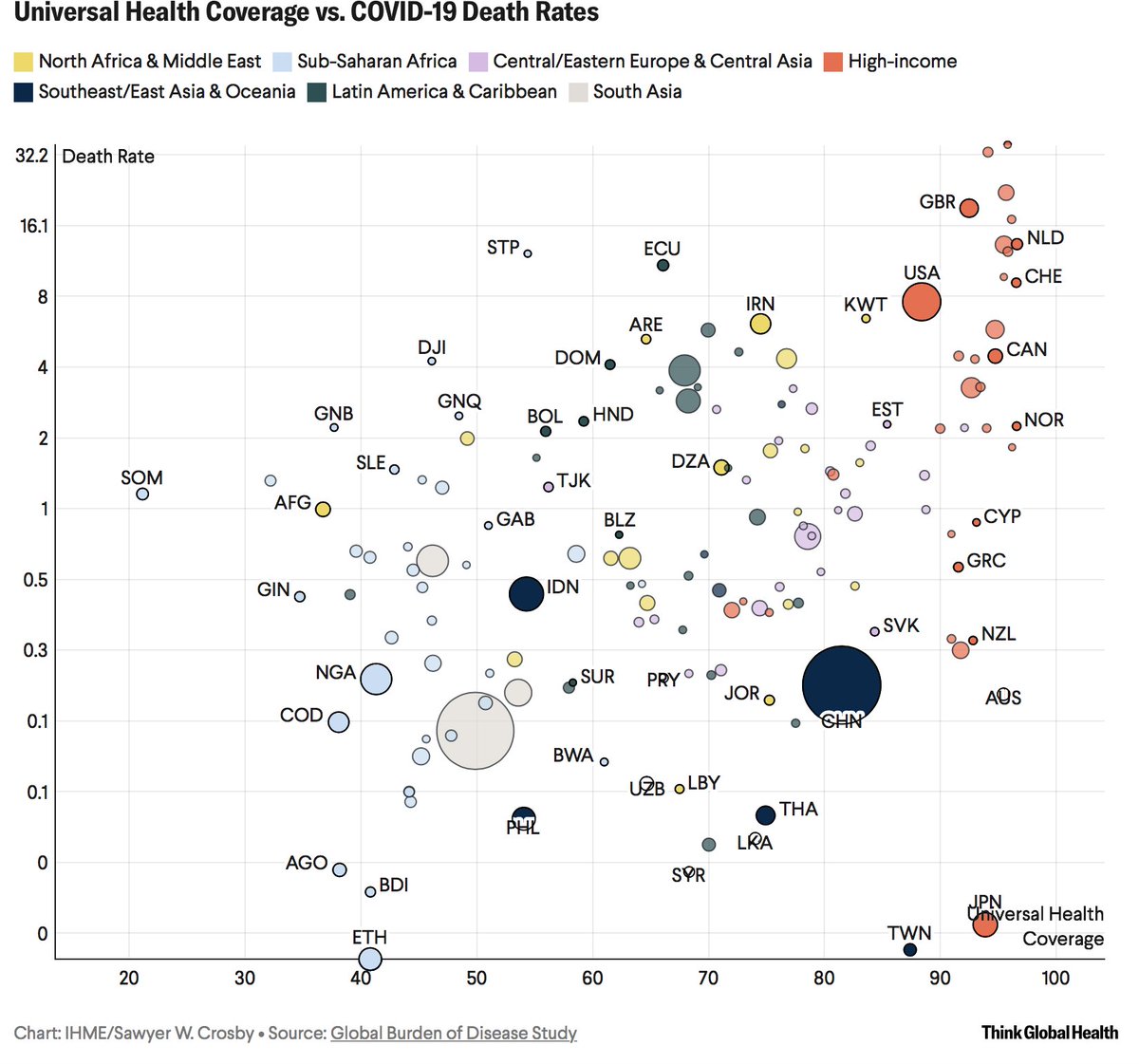
#COVID19 has revealed that we don't yet understand how best to measure countries' capacity to respond effectively to severe pandemic threats
this admittedly wonky thread is based on new @ThinkGlobalHlth post looking at JEE, GHSI & #UHC in this pandemic 2/
thinkglobalhealth.org/article/all-be…
this admittedly wonky thread is based on new @ThinkGlobalHlth post looking at JEE, GHSI & #UHC in this pandemic 2/
thinkglobalhealth.org/article/all-be…
First a bit of background on the different measures of pandemic preparedness 3/
Following the 2014–16 Ebola epidemic in West Africa, @WHO & partners developed Joint External Evaluation (JEE) process to monitor countries’ adoption and implementation of the core capacities under the International Health Regulations 4/
who.int/ihr/procedures…
who.int/ihr/procedures…
More than one hundred nations have undertaken voluntary Joint External Evaluations
This super helpful @ResolveTSL tool combines the results into a single score for each country, based average score of 19 preparedness areas measured by JEE 5/ preventepidemics.org/map/
This super helpful @ResolveTSL tool combines the results into a single score for each country, based average score of 19 preparedness areas measured by JEE 5/ preventepidemics.org/map/
Another metric, the 2019 Global Health Security (GHS) Index go beyond JEE.
It's a comprehensive assessment & benchmarking tool that measures country capacity to rapidly respond to & mitigate spread of an epidemic 6/
ghsindex.org/about/
It's a comprehensive assessment & benchmarking tool that measures country capacity to rapidly respond to & mitigate spread of an epidemic 6/
ghsindex.org/about/
Universal health coverage (UHC), a measure of access to quality health services and protection from hardship, is another metric for which many have advocated as a potential means of improving #globalhealth security 7/
gh.bmj.com/content/bmjgh/…
gh.bmj.com/content/bmjgh/…
But when you look at a consistent measure of performance none of our metrics have done well
This figure compares JEE readyscore w/cumulative reported, age-standardized #COVID19 deaths per 100k people in 50 days following date of first death in that country
No correlation 8/
This figure compares JEE readyscore w/cumulative reported, age-standardized #COVID19 deaths per 100k people in 50 days following date of first death in that country
No correlation 8/
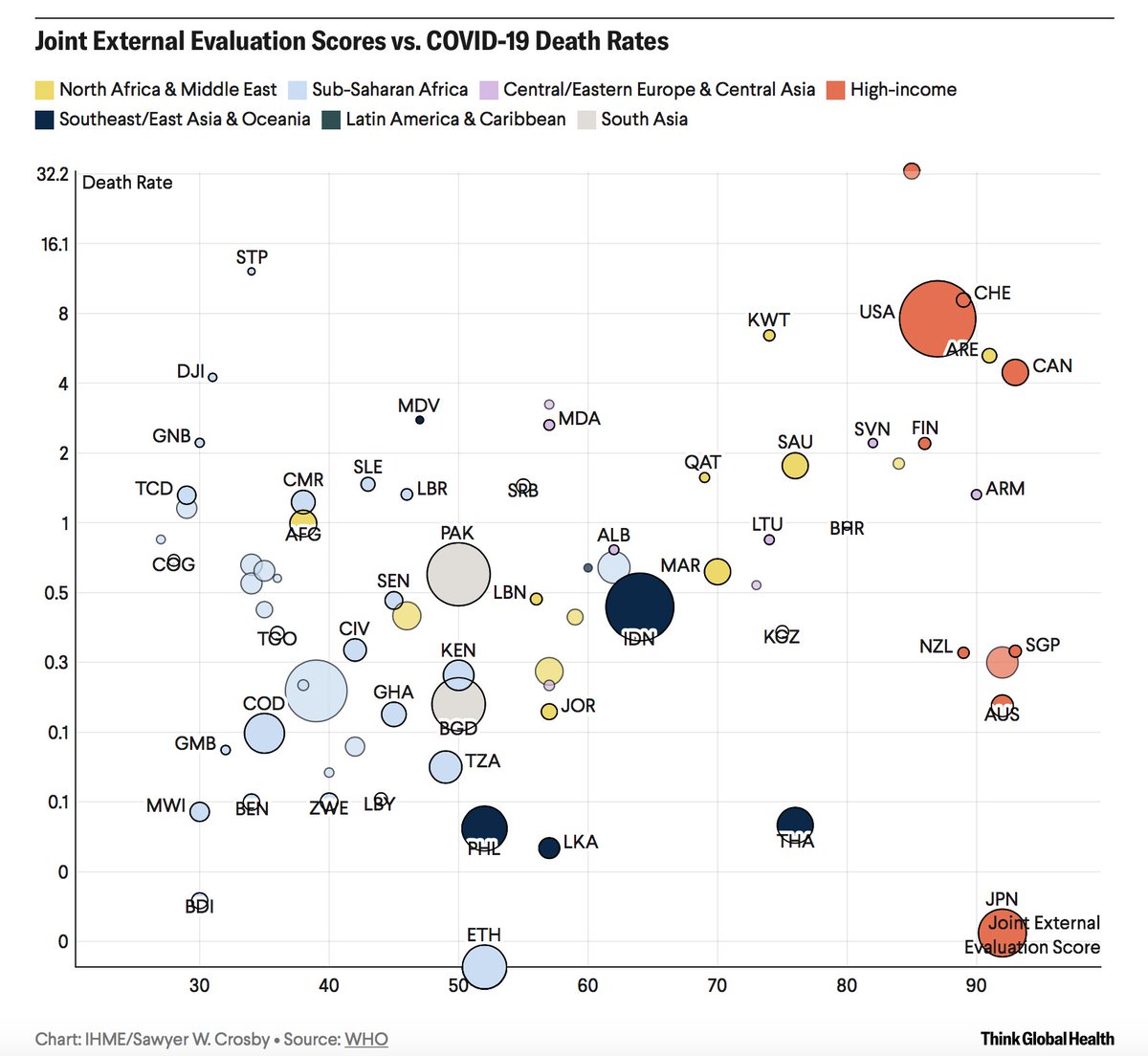
The same is true of the Global Health Security Index
This figure shows overall GHS Index score, but we ran same comparison on more specific indicators from index, such as the “Rapid Response to and Mitigation of the Spread of an Epidemic”
Got similar results 9/
This figure shows overall GHS Index score, but we ran same comparison on more specific indicators from index, such as the “Rapid Response to and Mitigation of the Spread of an Epidemic”
Got similar results 9/
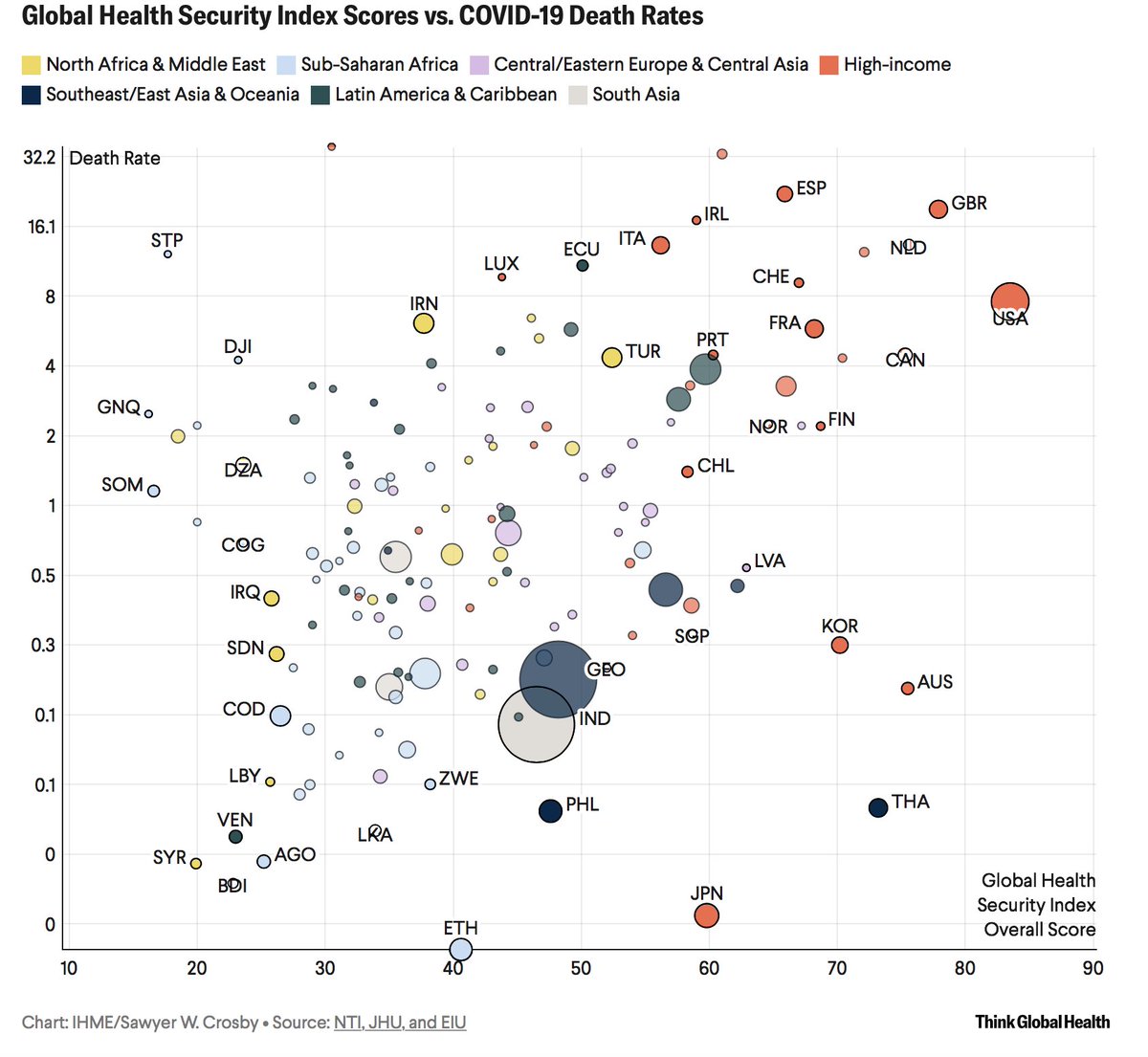
#UHC has so far not fared any better
Several countries that acted quickly to contain #COVID19, (eg South Korea & Taiwan) have high levels of universal health coverage. But same is true for many that have struggled in this pandemic, including Italy and United Kingdom 10/
Several countries that acted quickly to contain #COVID19, (eg South Korea & Taiwan) have high levels of universal health coverage. But same is true for many that have struggled in this pandemic, including Italy and United Kingdom 10/
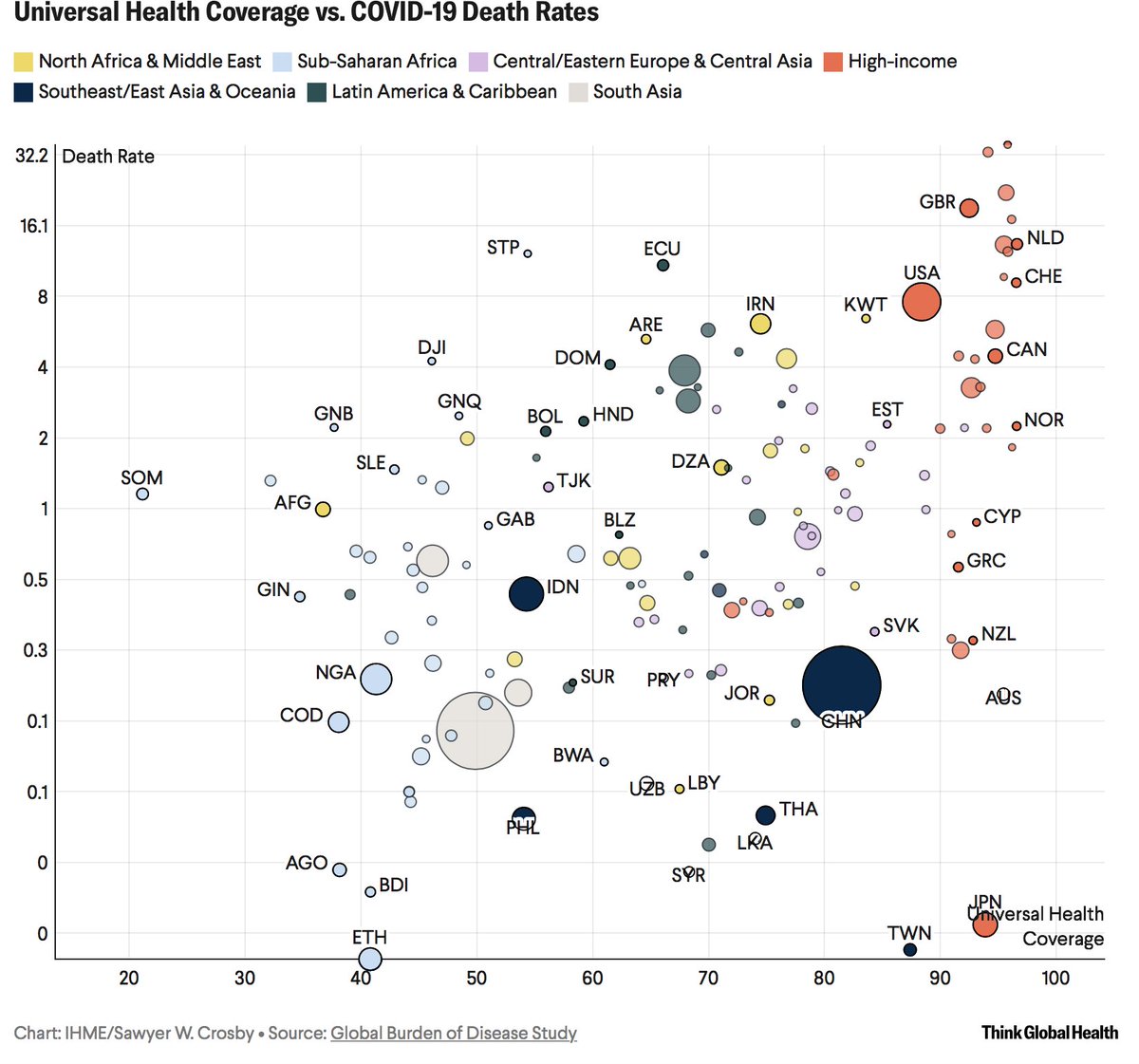
One answer is that JEE, the Global Health Security Index, and measures of #UHC are not meant to predict health outcomes
They are important tools for identifying gaps in capacity and mobilizing financial and political support to fill those gaps 12/
They are important tools for identifying gaps in capacity and mobilizing financial and political support to fill those gaps 12/
Francis Fukuyama argues in @ForeignAffairs: capacity is 1 of 3 essential ingredients to nations’ success in #COVID19 pandemic—effective leadership and a government that citizens trust and listen to must also be in the mix
That insight rings true 13/ foreignaffairs.com/articles/world…
That insight rings true 13/ foreignaffairs.com/articles/world…
But in that formulation, you would expect capacity to be necessary, but not sufficient for success against #COVID19
At least as measured by JEE, GHSI, & UHC, that has not *so far* been case. Look at Vietnam 14/
At least as measured by JEE, GHSI, & UHC, that has not *so far* been case. Look at Vietnam 14/

My coauthors --Joe Dieleman, Sawyer Crosby @IHME_UW & @samckiernan -- and me are not first to observe this disconnect between capacity & #COVID19 performance
@udnore, Ahmed Razavi, & @DrEmeruemJnr wrote this on the GHS Index in @GlobalHealthBMJ 15/ gh.bmj.com/content/5/4/e0…
@udnore, Ahmed Razavi, & @DrEmeruemJnr wrote this on the GHS Index in @GlobalHealthBMJ 15/ gh.bmj.com/content/5/4/e0…
Independent Oversight and Advisory Committee for the @WHO Health Emergencies Program (h/t @JeremyKonyndyk) observed this too on JEE 16/
who.int/about/who_refo…
who.int/about/who_refo…
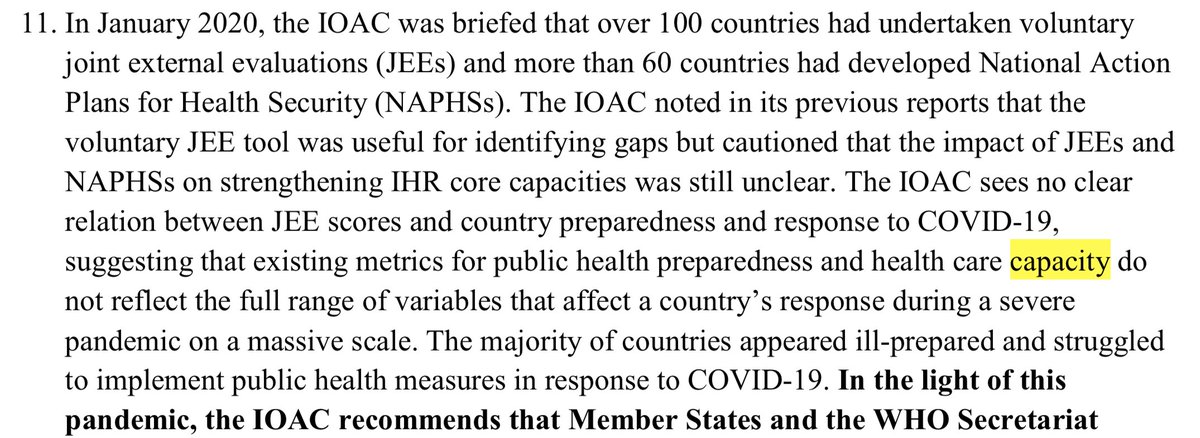
The contribution of this @ThinkGlobalHlth post is visualizing that disconnect with regard to #COVID19 deaths, extending analysis to #UHC, and accounting for national differences in population age-structure and the timing of the epidemic 17/
thinkglobalhealth.org/article/all-be…
thinkglobalhealth.org/article/all-be…
To end this long thread:
#COVID19 suggests as we scale up investments & create funds to help countries prepare for future epidemics, we also need to think more a/b how we measure preparedness & combine w/efforts to foster readiness & implementation 18/18
thinkglobalhealth.org/article/all-be…
#COVID19 suggests as we scale up investments & create funds to help countries prepare for future epidemics, we also need to think more a/b how we measure preparedness & combine w/efforts to foster readiness & implementation 18/18
thinkglobalhealth.org/article/all-be…
• • •
Missing some Tweet in this thread? You can try to
force a refresh







